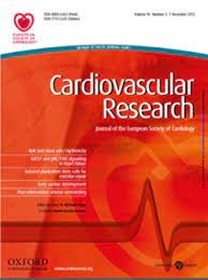膳食盐、血管功能障碍和认知障碍。
IF 10.2
1区 医学
Q1 CARDIAC & CARDIOVASCULAR SYSTEMS
引用次数: 0
摘要
过量摄入盐分是全球的一个主要健康问题,会导致严重的心血管疾病,包括高血压、心脏病和中风。此外,高盐饮食越来越多地与动物模型中的认知障碍和人类的晚年痴呆症有关。高盐摄入对脑血管有害,会破坏大脑的血液供应,并可能导致阿尔茨海默病的病理变化。虽然动物模型加深了我们对细胞和分子机制的了解,但还需要更多的研究来进一步阐明盐对大脑功能的影响。此外,过量摄入食盐与认知障碍之间的关系还需要在人体中进行更深入的研究。由于食盐对大脑的有害影响与其对血压的影响无关,因此在本综述中,我将专门讨论在血压没有变化的情况下,食盐对血管和认知功能的影响在实验模型和人体中的现有证据。鉴于盐对免疫细胞功能的强烈影响,我还将讨论将食盐摄入与肠道免疫失调联系起来的证据,并特别关注盐破坏 T-helper 17 (Th17) 细胞平衡的能力。最后,我将简要讨论有关 Th17 细胞产生的主要细胞因子 IL-17A 与血管功能障碍和认知障碍有关的数据。本文章由计算机程序翻译,如有差异,请以英文原文为准。
Dietary salt, vascular dysfunction, and cognitive impairment.
Excessive salt consumption is a major health problem worldwide leading to serious cardiovascular events including hypertension, heart disease and stroke. Additionally, high salt diet has been increasingly associated with cognitive impairment in animal models and late-life dementia in humans. High salt consumption is harmful for the cerebral vasculature, disrupts blood supply to the brain and could contribute to Alzheimer's disease pathology. Although animal models have advanced our understanding of the cellular and molecular mechanisms, additional studies are needed to further elucidate the effects of salt on brain function. Furthermore, the association between excessive salt intake and cognitive impairment will have to be more thoroughly investigated in humans. Since the harmful effects of salt on the brain are independent by its effect on blood pressure, in this review, I will specifically discuss the evidence, available in experimental models and humans, on the effects of salt on vascular and cognitive function in the absence of changes in blood pressure. Given the strong effects of salt on the function of immune cells, I will also discuss the evidence linking salt consumption to gut immunity dysregulation with particular attention to the ability of salt to disrupt T-helper 17 (Th17) cells homeostasis. Lastly, I will briefly discuss the data implicating IL-17A, the major cytokine produced by Th17 cells, in vascular dysfunction and cognitive impairment.
求助全文
通过发布文献求助,成功后即可免费获取论文全文。
去求助
来源期刊

Cardiovascular Research
医学-心血管系统
CiteScore
21.50
自引率
3.70%
发文量
547
审稿时长
1 months
期刊介绍:
Cardiovascular Research
Journal Overview:
International journal of the European Society of Cardiology
Focuses on basic and translational research in cardiology and cardiovascular biology
Aims to enhance insight into cardiovascular disease mechanisms and innovation prospects
Submission Criteria:
Welcomes papers covering molecular, sub-cellular, cellular, organ, and organism levels
Accepts clinical proof-of-concept and translational studies
Manuscripts expected to provide significant contribution to cardiovascular biology and diseases
 求助内容:
求助内容: 应助结果提醒方式:
应助结果提醒方式:


